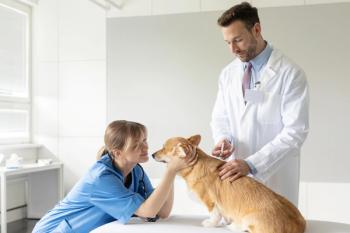
Tackling tension on your team (sponsored by Intervet/Schering-Plough Animal Health)
Start now to forge-or fix-working relationships between your technician and the new intern or associate.
When a new intern or associate comes on the scene, eager to show what he or she learned in school and practice all the hands-on procedures, your experienced technician can feel a little underappreciated. As the practice owner, you set the tone for practice teamwork and camaraderie. Make sure your technician is involved in preliminary interviews and working interviews with a potential intern or associate. Then, once the doctor shows up, consider the following tips to build a great working relationship between the technician and your new doctor.
Technicians can train
Interns and relatively green associates need some field training—and you don't always have time to do it. After all, an intern or associate often comes in to lighten the load on you. That's where your technician comes in, says Deborah Reeder, RVT, executive director and former president of the American Association of Equine Veterinary Technicians (AAEVT). Make sure your technician takes the initiative and approaches new doctors with a self-introduction and an explanation of what the technician can do and how he or she can help. If the technician is particularly shy, introduce them yourself.
"Technicians should tell the new doctor what they love to do and are good at, and share what they want to learn, too," Reeder says. You or your technician can let a new doctor know, for example, that the technician can prepare vaccines, draw blood, put together estimates, and share handouts with clients. Don't let your technician's skills languish; you don't want to lose your skilled surgical and anesthesia assistant because you gave the job to an intern for a year. Technicians can also:
- Introduce the new doctor to clients
- Explain the protocols at your practice that might be unfamiliar
- Tour the inventory and share information about ordering supplies
- Demonstrate techniques that have worked in the field, and ask for the new doctor's input
- Share insight about quirks on the part of the boss, clients, and notorious patients. For instance, a technician can warn a new doctor about troublesome horses: "When that one comes in, make sure you get extra help."
A good relationship from the start will also mean your technician can learn a lot from the new doctor without getting into a power struggle. "A good technician will learn something new from a veterinarian who came from a different veterinary school," Reeder says.
Find common ground
If your technician isn't getting along with a new doctor, encourage her to explore common ground. Ask her to investigate the doctor's background in medicine and horsemanship. Did the doctor grow up on a farm? Did he or she own horses, competing or showing them? When the technician learns why the doctor's approach differs from hers, she can turn that information into better communication.
For instance, a new doctor eager to order loads of diagnostics may get off on the wrong foot with a no-nonsense trainer who thinks the treatment is obvious, says Dr. Christine Merle, MBA, CVPM, executive director of VetPartners and a consultant with Brakke Consulting. "It can be part of a technician's job to help the associate explain the importance of the testing," Dr. Merle says. "How can the technician help the trainer understand that the new doctor is acting in the horse's best interest?"
If you help maintain open lines of communication by involving a technician early, introducing him or her and what he or she does for you every day, your technician can become the perfect working partner for the new doctor—whether the doctor is there for a year or eventually becomes the practice owner.
Newsletter
From exam room tips to practice management insights, get trusted veterinary news delivered straight to your inbox—subscribe to dvm360.





